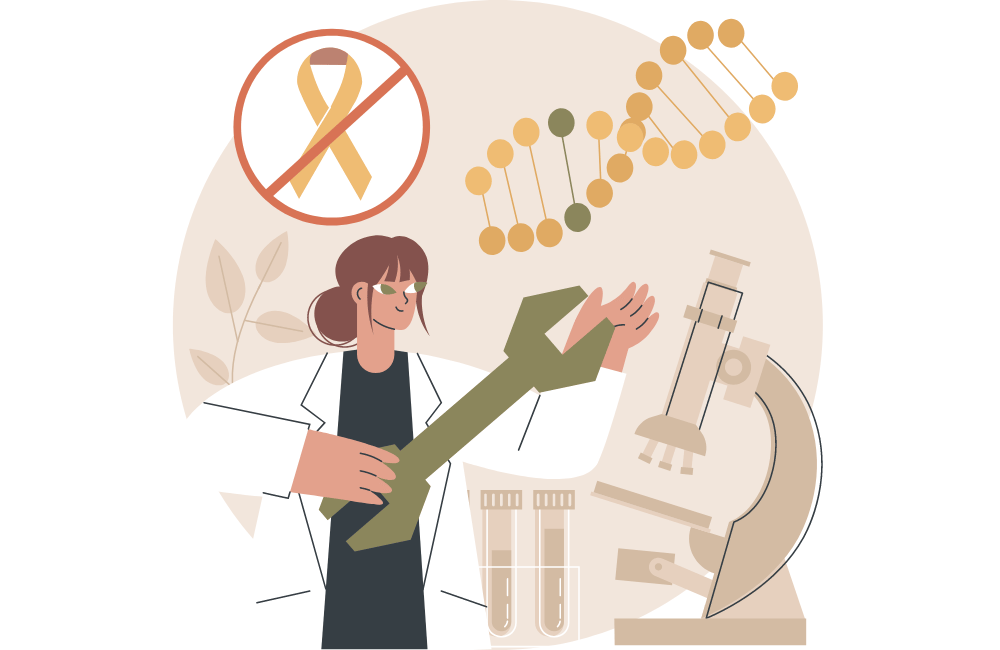In recent years, oncology has witnessed significant advancements, and one treatment approach that has gained considerable attention is immunotherapy. This revolutionary form of cancer treatment harnesses the body’s own immune system to target and combat cancer cells.

In this article, we will delve into the intricacies of immunotherapy, exploring its mechanisms, benefits, and potential side effects.
What is Immunotherapy?
Immunotherapy, also known as biologic therapy or biotherapy, is a cutting-edge cancer treatment that leverages the body’s immune system to fight cancer cells. Unlike traditional chemotherapy and radiation, which directly attack cancer cells, immunotherapy enhances the body’s natural defenses to recognize and destroy cancer more effectively.

Types of Immunotherapy
Checkpoint Inhibitors
Checkpoint Inhibitors are among the most widely used forms of immunotherapy. These drugs block certain proteins in cancer or immune cells, allowing the immune system to identify and attack cancer cells more efficiently. Pembrolizumab (Keytruda) and Nivolumab (Opdivo) are examples of checkpoint inhibitors.
CAR-T Cell Therapy Chimeric Antigen Receptor T-cell
(CAR-T) therapy is a personalized immunotherapy that involves extracting a patient’s T-cells, modifying them in a lab to target specific cancer cells, and then infusing them back into the patient’s bloodstream. CAR-T therapy has shown remarkable results in treating certain blood cancers.
Cancer Vaccines
Cancer vaccines work similarly to traditional vaccines, but instead of preventing infections, they stimulate the immune system to recognize and attack cancer cells. These vaccines can be preventive or therapeutic, focusing on preventing cancer recurrence or treating existing cancer.
Adoptive Cell Transfer
Adoptive Cell Transfer involves collecting immune cells from a patient, enhancing their ability to fight cancer, and reintroducing them into the patient’s body. This approach has demonstrated significant promise in treating melanoma and other types of cancer.
How Immunotherapy Works
Recognizing Cancer Cells
Recognizing Cancer Cells often evade detection by the immune system due to their ability to disguise themselves as normal cells. Immunotherapy helps the immune system recognize these camouflaged cancer cells by interfering with the signals that prevent immune cells from attacking them.
Activating Immune Response
Activating Immune Response, Immunotherapy activates the body’s immune response in various ways. For instance, checkpoint inhibitors target specific proteins like PD-1 or CTLA-4, which act as brakes on immune cells. By blocking these proteins, checkpoint inhibitors unleash the full potential of immune cells, enabling them to attack cancer cells more aggressively.
Targeting Cancer-Specific Antigens
CAR-T cell therapy and cancer vaccines take a more targeted approach by focusing on specific antigens on the surface of cancer cells. CAR-T cells are engineered to express a chimeric antigen receptor that recognizes these antigens, allowing them to seek out and destroy cancer cells effectively.
Benefits of Immunotherapy
As a revolutionary approach to cancer treatment, immunotherapy offers several significant benefits over traditional therapies. Let’s delve into the details of each advantage:
Precise and Targeted Approach
Unlike conventional treatments like chemotherapy and radiation, which can affect cancerous and healthy cells, immunotherapy targets the immune system to identify and attack cancer cells. This targeted approach is based on understanding the interaction between cancer cells and the immune system. It uses substances that stimulate the immune system or target specific molecules in cancer cells, making it more precise in its action.
Focusing on cancer cells directly reduces collateral damage to healthy cells, reducing severe side effects often associated with traditional treatments. Patients undergoing immunotherapy tend to experience milder and more manageable side effects, enhancing their overall quality of life during the treatment process.
Long-lasting Effects
One of the most promising benefits of immunotherapy is its potential to provide long-term remission or even a cure in some cases. While effective in shrinking tumors, traditional treatments may not always eradicate cancerous cells entirely. This can lead to relapses and the need for additional rounds of treatment. However, immunotherapy, especially in cases where it triggers a robust and sustained immune response, can result in lasting remission.
The immune system has a memory function enables it to recognize and remember cancer cells, potentially preventing cancer recurrence even after the treatment is completed. This long-term effect has been observed in some patients who have undergone immunotherapy, leading to new hope in the fight against cancer.
Combination Potential
Immunotherapy is not limited to a stand-alone treatment. It can be effectively combined with other therapies such as chemotherapy, radiation, targeted therapies, and other immunotherapies. This combination approach is known as “combinatorial immunotherapy.”
Combining different treatment modalities can lead to synergistic effects, where the combined therapies enhance each other’s efficacy, improving patient outcomes. For example, some cancer cells may be resistant to certain treatments, but by combining immunotherapy with another treatment, the resistant cancer cells could become more susceptible to destruction by the immune system or the other treatment.
Furthermore, combining immunotherapy with other treatments can also help overcome the limitations of each individual therapy. It broadens the scope of treatment options and can be tailored to the specific needs of the patient and the characteristics of their cancer.
Potential Side Effects
Immunotherapy has emerged as a groundbreaking approach to cancer treatment, but like any medical intervention, it can come with potential side effects. Patients and healthcare providers must know these side effects to ensure timely management and optimal patient care.
- Fatigue: Fatigue is one of the most common side effects experienced by patients undergoing immunotherapy. Cancer can be exhausting, and immunotherapy can further contribute to this feeling of tiredness. Fatigue may range from mild to severe and can impact daily activities, work, and overall quality of life. Patients are advised to get enough rest and engage in light physical activities if possible, but it’s essential not to overexert themselves during treatment.
- Skin Reactions: Skin-related side effects are also frequently observed with immunotherapy. Patients may experience rashes, itching, or blistering on the skin. In some cases, these skin reactions may resemble sunburn. These side effects are generally manageable with topical creams, ointments, or antihistamines, but patients must promptly report any skin changes to their medical team.
- Flu-like Symptoms: Patients undergoing immunotherapy may experience flu-like symptoms, such as fever, chills, muscle aches, and headaches. These symptoms are usually temporary and occur due to the immune system’s activation in response to the treatment. Adequate hydration and over-the-counter medications like acetaminophen can help alleviate these symptoms.
- Immune-Related Side Effects: While most side effects of immunotherapy are manageable, more severe immune-related side effects can occur in some patients. These occur when the immune system becomes overactive and attacks healthy tissues and organs in addition to cancer cells. The severity of these side effects can vary and may affect different organs:
- Pneumonitis: Inflammation of the lungs that can cause shortness of breath, cough, and chest pain.
- Hepatitis: Inflammation of the liver that can lead to jaundice, abdominal pain, and changes in liver function tests.
- Colitis: Inflammation of the colon, resulting in diarrhea, abdominal cramps, and sometimes bloody stools.
- Endocrinopathies: These affect the endocrine system and can lead to hormonal imbalances, resulting in symptoms like fatigue, weight changes, and blood sugar levels.
These immune-related side effects require immediate medical attention and may be managed with corticosteroids or other immunosuppressive medications to calm the immune response. Timely recognition and intervention are crucial to prevent further complications.
Patients must work closely with their medical team throughout the course of immunotherapy. Regular check-ups, monitoring of blood work, and open communication about any symptoms or side effects are essential for effective management. Healthcare providers will carefully assess the risk-benefit profile for each patient and tailor the treatment plan accordingly.
It’s important to note that while side effects can be challenging, they occur in a minority of patients, and many individuals tolerate immunotherapy well with minimal adverse effects. The potential benefits of immunotherapy, including long-term remission and improved survival rates, often outweigh the risks associated with these side effects.
Conclusion: Immunotherapy – A Comprehensive Guide 2023
Immunotherapy has revolutionized the field of cancer treatment, offering a promising avenue for improved patient outcomes and a potential cure in some cases. This groundbreaking approach harnesses the power of the patient’s own immune system to identify and target cancer cells, providing a more precise and targeted treatment option. As of 2023, immunotherapy continues to show remarkable promise, with ongoing research and advancements further expanding its potential.
The benefits of immunotherapy are multifaceted. Its targeted approach minimizes damage to healthy cells, reducing the risk of severe side effects common in traditional treatments. Moreover, some patients experience long-lasting effects, achieving sustained remission or even a cure. Additionally, immunotherapy’s compatibility with other treatments allows for combination therapy, leading to synergistic effects and improved outcomes.
However, it is essential to recognize that immunotherapy may also cause side effects, ranging from mild to severe. Patients must work closely with their medical team to monitor and manage these side effects effectively, ensuring the best possible care during the treatment process.
In conclusion, immunotherapy represents a transformative shift in cancer treatment, offering new hope to patients and their families. As research and development in this field continue to progress, immunotherapy’s potential is expected to grow even further, impacting not only cancer but potentially other diseases as well. With ongoing advancements and the dedication of medical professionals, immunotherapy is poised to play an increasingly prominent role in the fight against cancer, improving the lives of countless individuals worldwide. As we move into the future, continued support and investment in immunotherapy research are paramount, as it holds the key to unlocking new frontiers in medical science and enhancing the quality of life for those battling cancer.

